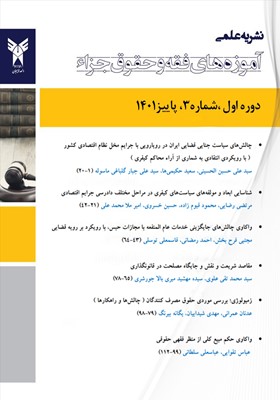مقاصد شریعت و نقش و جایگاه مصلحت در قانونگذاری
محورهای موضوعی : آموزه های فقه و حقوق جزاء
سید محمد تقی علوی
1
*
,
سیده مهشید میری بالاجورشری
2
![]()
1 - استاد گروه فقه و حقوق، دانشگاه تبریز، تبریز، ایران
2 - دانش آموخته کارشناسی ارشد حقوق جزاء و جرمشناسی، واحد لاهیجان، دانشگاه آزاد اسلامی، لاهیجان، ایران.
کلید واژه: مصالح مرسله, سکوت قانون, مقاصد شریعت, مصالح و مفاسد احکام, ما لا نص فیه,
چکیده مقاله :
مطابق نظر عدلیه، احکام شرعی تابع مصالح و مفاسد است؛ چنانکه احکام حکومتی نیز در راستای تأمین مصالح اجتماعی جامعه اسلامی است؛ از این رو، مصلحت در فقه اسلامی، در مقام فتوا و حکم حکومتی، از جایگاه مهمی برخوردار است. تمامی مذاهب اسلامی اتفاق نظر دارند که احکام بر مصالح و مفاسد مبتنی هستند و دین، در واقع برای جلب مصالح بندگان و دور نمودن مفسده از ایشان آمده است. از تأمل در آیات شریفه قرآن، سنت معصومین (ع) و عمل صحابه و فقهاء اسلامی، از عصر تکوین شریعت تاکنون این نتیجه، حاصل است که میان مقاصد شریعت و واژه های مصلحت و مفسده رابطه تنگاتنگی وجود دارد. در مقاله حاضر سعی شده است تا با مطالعه و تأمل در نظریه ی مقاصد شریعت و رابطه ی آن با مصالح و مفاسد به تحلیل برای مواردی نایل آید که تحت عنوان: ما لا نص فیه یا موارد سکوت قانون قرار دارد.
According to the opinion of justice ,the religious commandments are subject to expediencies and corruptions; as the governmental rulings are in line with the provision of social expediencies of Islamic society. Therefore, expediency at status of decree and governmental rulings has an important place in Islamic jurisprudence. All Islamic religions agree that the rulings are based on the expediencies and corruptions and actually the religion has come for attracting the expediencies of the servants and keeping the corruption away from them .From the age of genesis of religion till now by reflection on the noble verses of the Quran, the Sunnah of Innocent Ones and the actions of the Companions and Islamic jurists, this conclusion is obtained that there is a close relationship between the destinations of the religion and the words expediency and corruption. It is attempted in this article that by study and reflection on the theory of destinations of religion and its relationship with expediencies and corruptions, will attain to the analysis of cases that are placed as “ absence of legal text “ or other cases of silence of law.
منابع
_||_

